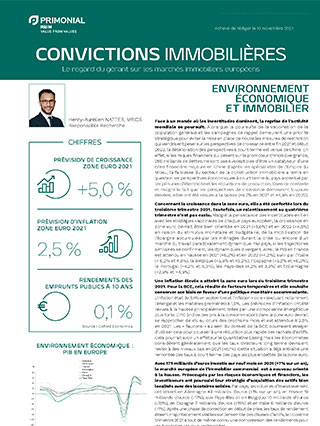- Home
- Studies and research
- Real estate investments Europe: 2nd quarter 2022
Real Estate Convictions Europe : 3rd quarter 2022
The repercussions of Russia’s invasion of Ukraine have created substantial challenges for the world economy.
This has increased uncertainty and resulted in repeated cuts of global growth forecasts since the beginning of the conflict, with the latest figure suggesting growth of 2.8% in 2022. The tightening of monetary and fiscal conditions in an attempt to control inflationary pressures has directly resulted in the slowing of growth that we are already seeing. Although growth in 2022 is showing good resilience, we are likely to see a slowdown in 2023 before a recovery in 2024.
When it comes to the eurozone, the trend will be similar to that in the global economy, with a resilient performance in 2022 (3% growth) followed by a marked slowdown in 2023.Europe, closest to the front-line of the conflict after Ukraine itself, is seeing its national economies bear the full burden, particularly in the cases of Germany (1.4% growth in 2022) and Italy (3.4%), due to their dependence on Russian gas. Growth in Belgium (2.5%), France (2.6%), the Netherlands (4.7%) and Spain (4.4%) will hold up better over 2022.
Europe’s current cost of living crisis is first and foremost the direct consequence of the effects of the war in Ukraine on energy and food prices. Shortages of materials, equipment and labour are also pushing up prices. At the end of October 2022, the ECB made its third move of the year, with an additional 75bp increase in its policy rates as it attempts to limit the sharp rise in inflation (10.0% year-on-year in September). Current forecasts suggest high inflation in 2022 (8.1%), and the target of bringing consumer price inflation back to 2% only looks achievable over the medium to long term.
Accelerated interest rate rises will result in a significant increase in the cost of money via lending rates. This paradigm shift resulted in a tightening of lending conditions for businesses and consumers in the third quarter of 2022. This led to a fall in demand for loans, and could result in financial pressure in countries where the share of floating rate loans is significant.
Over the first nine months of 2022, the European real estate market saw €202 billion of investment1, similar to the volume seen in 2021. However, after a very strong start to the year the market slowed down in the third quarter, affected by the geopolitical situation and the increase in interest rates.
Rising uncertainty and questions over the economic outlook started to hit transaction volumes in the third quarter, limiting them to €51 billion, a 34% drop over a year. Investors have been biding their time and focusing on the acquisition of assets that conform to their risk/return strategies, with possible adjustments made to reflect economic conditions.
Looking at the major countries, investment volumes were €54 billion in the UK (up 8% over the year), €35 billion in Germany (-28%), €25 billion in France (+11%), €12 billion in Spain (+51%), €11 billion in the Netherlands (-19%) and €8 billion in Italy (+32%).
Offices were the dominant asset class, with €69 billion, followed by logistics (€46 billion), residential (€45 billion), retail (€28 billion), hotels (€9 billion) and healthcare (€5 billion).
Following the ECB’s decision to raise its policy rates, the conditions for access to financing has changed very quickly. Although yields were mainly stable in the second quarter of 2022, some decompression was seen in response to expectations of bonds yield increases. In a smaller proportion of the market, yield compressions were observed for the most sought-after assets.
The fast increase in the cost of interest has consequences for the rate of growth in capital gains, but rental yields remain on a good path and are boosting performance. The repositioning of some yields continued over the third quarter of 2022, with a direct link to the strong and rapid increase in central bank policy rates. This phenomenon, nascent in the second quarter of 2022, thus became more widespread.
Although total returns are still on the right track, valuations have been affected, with performance now coming more from rental yields. Moreover, indexation, which is generally linked to the consumer price index, provides total or partial protection against inflation. As a result, in the current situation indexation, via increased rents, has taken up the running from capital gains in driving total returns. Clearly this capacity varies as a function of the financial stability of the tenant or operator (especially in the face of rising energy costs this winter), as well as by asset class and by country given differences in regulations.
Biding their time pending any possible price corrections, investors have adopted acquisition strategies focused on the best opportunities, which are completely dependent on market timing.
1 The real estate market covers offices, retail, logistics, services and residential assets for institutional investors.

The team

Henry-Aurélien Natter joined Praemia REIM as Research Manager in January 2018. He has the mission of developing the analyses of the Research & Strategy Department on the real estate markets, the economy and capital in France and in Europe.
Henry-Aurélien Natter began his career at Les Echos Etudes (formerly Eurostaf), then at C&W (formerly DTZ), and lastly at BNP PRE, where he acquired solid and varied experience in real estate research, strategy and finance. He is qualified with an AES degree in Business Management, a Masters Decree in management and SME management, and an International Master in commerce and marketing.
You may also like

- Market review
Real Estate Convictions : Q3 2024
In October 2024, the ECB announced its third consecutive rate cut to ease its restrictive monetary policy, and we believe that a new momentum has opened up for the European real estate market. Indeed, this quarter we have seen a thaw in certain real estate indicators.

- Market review
Real Estate Convictions : Q4 2024
The continued reduction in ECB interest rates, the level of savings amongst Europeans and the recovery of the real estate markets between 2022 and 2024 all point to the potential for improvement and a rebound in the sector.

- Market review
Real estate convictions : 1st quarter 2024
For now, European real estate professionals have been cautious and are watching for the tipping point that could occur with the announcement of the first change in direction by the ECB.


 et Firefox
et Firefox 